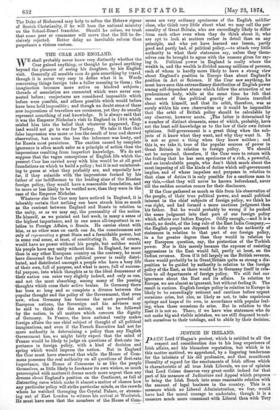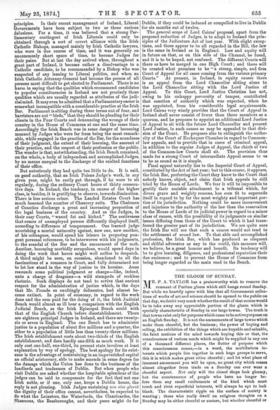JUSTICE IN IRELAND.
pACE Lord O'Hagan's protest, which is entitled to all the respect and consideration due to his long experience of Irish affairs, and his blameless reputation, but which is in this matter motived, we apprehend, by a lingering tenderness for the interests of his old profession, and that munificent liberality of regard for the emoluments of Irish offices which is characteristic of all true Irish Liberals, we are of opinion that Lord Cairns deserves very great credit indeed for that part of his measure of Judicature and Appeal which proposes to bring the Irish Bench into some reasonable relation with the amount of legal business in the country. this is a measure which no Liberal Administration, we fear, would have had the moral courage to undertake, though it is a measure much more consonant with Liberal than with Tory principles. In their recent management of Ireland, Liberal Governments have been subject to two or three curious delusions. For a time, it was believed that a strong Par- liamentary contingent of Irish Liberals could only be obtained through a sort of covert alliance with the Irish Catholic Bishops, managed mainly by Irish Catholic lawyers, who were in due course of time, and it was generally an uncommonly short space of time, to become Judges for their pains. But at last the day arrived when, throughout a great part of Ireland, it became rather a disadvantage to a Catholic candidate, to be recommended by a Bishop who was suspected of any leaning to Liberal politics, and when an Irish Catholic Attorney-General had become the person of all persons most difficult to get elected to Parliament. There is no harm in saying that the qualities which recommend candidates to popular constituencies in Ireland are not precisely those qualities which are usually regarded as attributes of the judi- cial mind. It may even be admitted that a Parliamentary career is somewhat incompatible with a considerable practice at the Irish Bar. Parliament is sitting during three terms out of four, and banisters are not "birds," that they should be pleading for their clients in the Four Courts and denouncing the wrongs of their country in the House of Commons at one and the same time. Accordingly the Irish Bench was in some danger of becoming manned by Judges who were far from being the most remark- able, while engaged in the practice of the Bar, for the soundness of their judgment, the extent of their learning, the amount of their practice, and the respect of their profession or the public. The wonder is that, notwithstanding, the Irish Bench remained, on the whole, a body of independent and accomplished Judges, by no means unequal to the discharge of the exalted functions of their office.
But notoriously they had quite too little to do. It is said, on good authority, that an Irish Puisne Judge's work, in any given year, might be easily got through, if he were to sit regularly, during the ordinary Court hours of thirty consecu- tive days. In Ireland, the tendency, in causes of the higher class, is besides, it is gratifying to observe, towards diminution. There is less serious crime. The Landed Estates Court has much lessened the number of Chancery suits. The Chairmen of Counties discharge a great and increasing proportion of the legal business of the country. And so the Judges, in their easy Courts, "waxed fat and kicked." The restiveness that comes of unemployed powers differently displayed itself, according to difference of temperament. One learned judge nourishing a mortal animosity against, now one, now another, of his colleagues, would spend his leisure in preparing pun- gent personal references, to be interwoven with his judgments, to the scandal of the Bar and the amusement of the mob. Another, becoming morbidly scrupulous, would spend days in doing the work that hours might well suffice to despatch. A third might be seen, on occasion, abandoned to all the fascinations of a romance in Court, and fully determined not to let law stand in the way of justice to its heroine. Anon resounds some political judgment or charge—like, indeed, unto a charge of dragoons—a wild stampede of reckless rhetoric. Such displays do not tend to revive that ancient respect for the administration of justice which, in the days that Mr. Fronde so exultingly delineates, had almost be- come extinct. In point of economy, in regard to the work done and the sum paid for the doing of it, the Irish Judicial Bench would almost as ill bear a comparison with the English Judicial Bench, as the Irish Episcopal Bench could with that of the English Church before disestablishment. There are eighteen principal Judges in Ireland, and there are twenty- six or seven in England. The one Bench has to administer justice to a population of about five millions and a quarter, the other to a population of little less than twenty-three millions. The Irish establishment costs about two-thirds of the English establishment, and does hardly one-fifth as much work. If it only cost one-half, one-third, its present state involves at least explanation by way of apology. The best apology for its exist- ence is the advantage of maintaining in an impoverished capital an official aristocracy, able to make amends in some degree for the damage which the Union has done to the business of the landlords and tradesmen of Dublin. But when people who visit Dublin are asked whether the hospitable splendour of the judges can be -said to compensate for the fact that not one Irish noble, or if one, only one, keeps a Dublin house, the reply is not pleasing. Irish Judges sustaining non sine glorici the dignity of their office cannot, nevertheless, be expected to do what the Leinsters, the Waterfords, the Clanricardes, the Shannons, the Bessboroughs, and their peers might do for
Dublin, if they could be induced or compelled to live in Dublin for six months out of twelve.
The general scope of Lord Cairns' proposal, apart from the proposed reduction of Judges, is to adapt to Ireland the prin- ciples of the Judicature Act of last year. With slight excep- tions, and these appear to be all regarded in the Bill, the law is the same in Ireland as in England. Law and equity will in future on that, as on this side of the Channel, be fused, and it is to be hoped, not confused. The different Courts will there as here be merged in one High Court ; and there will be created what promises to be "a strong, simple, and firm Court of Appeal for all cases coming from the various primary Courts." At present, in Ireland, in equity causes there is an appeal from the Lord Chancellor sitting alone to the Lord Chancellor sitting with the Lord Justice of Appeal. To this Court, Lord Justice Christian has not, owing to his unhappy perversity of temper, contributed that sanction of authority which was expected, when he was appointed, from his considerable legal acquirements. Lord Cairns very wisely provides that the Court of Appeal in Ireland shall never consist of fewer than three members as a quorum, and he proposes to appoint an additional Lord Justice of Appeal to sit with the future Lord Chancellor and present Lord Justice, in such causes as may be appealed to that divi- sion of the Court. He proposes also to extinguish the autho- rity of the Court of Exchequer Chamber in regard to Common- law appeals, and to provide that in cases of criminal appeal, in addition to the regular Judges of Appeal, the chiefs of two of the Common-law Courts shall sit. The provision thus made for a strong Court of intermediate Appeal seems to as to be as sound as it is simple.
Final appeal naturally lies to the Imperial Court of Appeal, constituted by the Act of last year; but to this course, it appears, the Irish Bar, preferring the Court they know to the Court that nobody knows, object, and claim that Irish appeals be still tried by the House of Lords. We fear it will be impossible to gratify their amiable attachment to a tribunal which, for divers grave and weighty reasons, has seen fit to supersede itself in regard to by far the most weighty and important por- tion of its jurisdiction. Nothing could be more inconvenient and injurious to the authority of the law than the reservation to the House of Lords of its judicial power in regard to a minor class of causes, with the possibility of its judgments on similar issues differing from those of the Court to which it had trans- ferred the greater part of its jurisdiction. We are quite sure the Irish Bar will see that such a course would not tend to the settlement of sound law. To that able and accomplished profession, the Irish Bar, which has produced as eloquent and skilful advocates as any in the world, this measure will, we believe, be a great honour and benefit. Its tendency will be to give learning, diligence, and professional reputation their due eminence ; and to prevent the House of Commons from being longer regarded as the main road to the Bench.



































 Previous page
Previous page